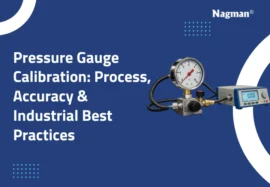In industries requiring precision instruments and equipment, calibrating is a very important procedure. Without the right calibrations, measurements can drift, processes may become unreliable, and even safety standards may be compromised. Be it manufacturing, energy, aerospace, or pharmaceuticals, machines and devices must perform consistently for excellence in operations.
In this blog, we look at the role that test bench have in industrial calibration.
Introduction to Industrial Calibration
The process of aligning measurement devices with a known standard to ensure accuracy and reliability is known as calibrating the instrument. It is a practice compliant with industry regulations that helps decrease downtime and enhance productivity for better quality overall.
For example, in a factory where pressure gauges or flow meters are used, accurate calibrations make sure that the products are safe and meet quality standards and also help maintain the efficiency of operations.
What Is a Test Bench?
A test bench is a fixed or semi-portable facility that is used to test, verify and calibrate industrial equipment in a controlled environment. As compared to handheld/portable calibrators, test benches offer a specialised environment in which more advanced testing can be performed with high accuracy and repeatability.
They normally combine power supplies, measurement tools, data acquisition systems and even custom software to calibrate to the required specifications.
How Test Benches Work in Calibration
The working principle of test benches is simple and efficient. Devices are installed on the bench, connected to reference standards and tested in simulated operating conditions.
An example is the pressure sensor, which can be exposed to different pressures, or the electrical meters, which can be tested against a specific voltage output. The bench reading is then compared to the device reading, and modifications are made where necessary. This process helps in accurate calibration for all instruments being tested.
Key Features of Modern Test Benches
Test benches have advanced tremendously in recent years. Some of their most notable features include:
- Automation: Automated testing and reporting is made possible with software integration, saving time and eliminating human error.
- Multi-functionality: Can test multiple parameters on the same platform, like pressure, temperature, and electrical outputs.
- Data logging: In-built data capturing, storing and analysis of calibration data for compliance and audits
- Safety mechanisms: Added safety features keep the operators safe when handling equipment under high pressure or high voltage.
Benefits of Using Test Benches in Industry
The adoption of test benches for calibrating tools offers several advantages:
- Great accuracy and reliability in comparison to manual calibrating tools.
- Replicability of results, so that all instruments are calibrated to industry standards
- Increased efficiency with the possibility of testing several devices within a single session.
- Test benches are designed to calibrate according to international calibration standards.
- Long-term cost savings, since accurately calibrating the equipment minimises downtime and the risk of faulty production runs.
Test Benches vs. Portable Calibrators
Portable calibrators are handy in on-site testing and troubleshooting, and are advantageous, but are not a substitute for the accuracy and durability of a test bench. Fieldwork and fast verification are most appropriate with portable devices, and test benches provide the controlled environment to perform detailed calibrations.
In sectors where accuracy and adherence are not negotiable, test benches are the foundation of calibration programmes.
How to Choose the Right Test Bench
Selecting the right test bench depends on the needs of the industry.
Consider the following before looking for test benches:
- Types of instruments being calibrated (pressure, electrical, thermal, etc.).
- The automation level required.
- Available space and whether a modular or compact design is required
- Budget considerations to balance upfront costs with long-term benefits.
- Compliance standards ensure that the test bench are compliant with industry-specific regulatory compliance.
Industry Applications of Test Benches
There are many industries that use test benches:
- Manufacturing: To calibrate measurement instruments in assembly lines.
- Oil and gas: To test pressure gauges and flow meters used in pipelines.
- Aerospace: For high-precision calibration of navigation and safety instruments.
- Healthcare and pharmaceuticals: To ensure medical devices and laboratory instruments are working properly.
- Power and energy: To test electrical meters and transformers critical to energy distribution.
Conclusion
Accuracy and efficiency are not just desirable in the fast-paced industrial environment of today; they are essential. Test benches have become an important pillar of modern industry with their high accuracy, reliability and capability to automate processes. The right test bench can transform the calibrating process from a routine requirement to a competitive advantage by guaranteeing productivity, safety, and long-term success.






